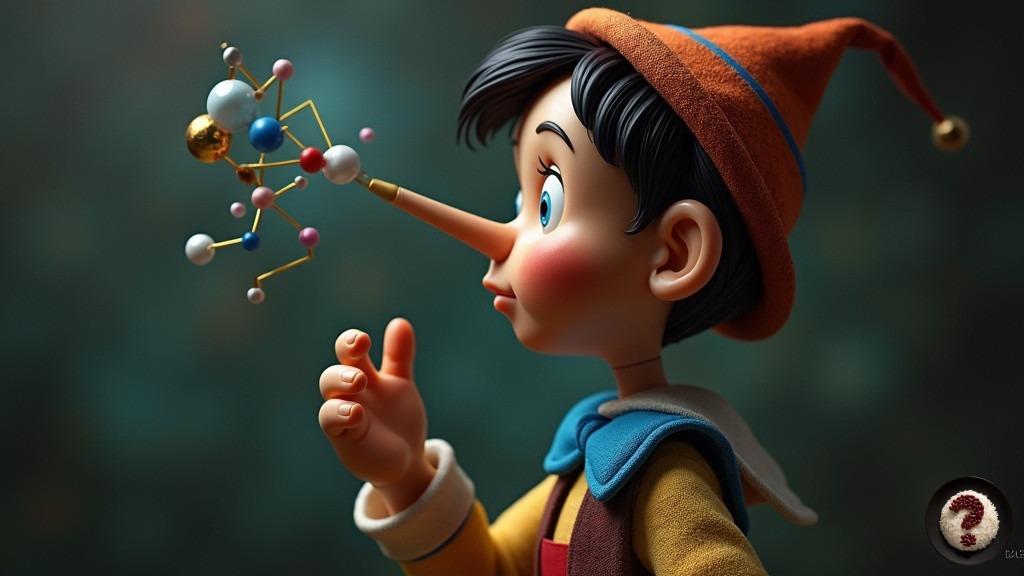
The Pinocchio Paradox: “My Nose Will Grow Now” and the Brain-Burning Labyrinth of Logic
Some paradoxes both confuse the mind and leave a slight smile on our faces. The Pinocchio Paradox is just such a riddle. The famous nose of the charming wooden boy we know from fairy tales grows when he lies. But what happens if Pinocchio says, “My nose will grow now”? If his nose actually grows, that means what he said was true, but since his nose only grows when he lies, does that make it a lie? Here, logic twists and turns like a snake biting its own tail.
This paradox was first presented in 2001 by an American high school student named Veronique Eldridge-Smith. This seemingly simple scenario, which holds a deep complexity, offers a creative and fun perspective on the classic “liar paradox.” The classic paradox, known for abstract sentences like “I am lying now,” takes on a colorful and fairytale form thanks to Pinocchio.
The foundation of the paradox rests on the fact that Pinocchio’s nose only grows when he tells a lie – this is the universal rule of his world. Now, let’s return to the sentence, “My nose will grow now”: If his nose actually grows, that means what he said was true. But since his nose only grows when he lies, his nose growing despite telling the truth creates a contradiction. If it doesn’t grow, he has told a lie, and his nose should have grown. So no matter what happens, logic folds back in on itself.

The Philosophical Labyrinth
For philosophers and logicians, such paradoxes are like mental puzzles. Just like the statement “This sentence is false,” Pinocchio’s line cannot be both true and false. The truth of the sentence depends on its outcome; yet the outcome determines the truth of the sentence. In a sense, the cause-and-effect relationship is knotted together. If you try to solve this using diagrams on paper, you’ll likely end up back where you started.
This paradox falls under the category of logical problems known as “self-referential paradoxes.” A paradox arises when a statement refers to itself, and this reference conflicts with its truth value. Pinocchio saying, “My nose will grow now,” is exactly this kind of contradiction. Furthermore, the fact that this paradox emerged from a children’s story to form the basis of philosophical discussions makes it even more interesting.
Is There a Solution?
Is there a solution to this paradox? Naturally, a definitive solution has still not been found. However, some thinkers propose alternative approaches. For instance, if one introduces the assumption that “Pinocchio’s nose only grows when he consciously lies,” the situation simplifies a bit. In this case, if Pinocchio genuinely believes his nose will grow but it doesn’t happen, it’s not considered a lie, and his nose doesn’t grow. But here, abstract concepts like “intention” get involved, and things become complex again.
The Pinocchio paradox attracts great interest not only in academic circles but also in internet culture. Through cartoons, animations, and social media shares, this knot of logic is addressed in entertaining ways. Some even joke: If Pinocchio were an AI, his processor would burn out along with his nose after uttering that sentence!
These kinds of paradoxes are also quite valuable from an educational perspective. They are thought-provoking examples that capture students’ interest in philosophy and logic classes. They are an ideal tool for concretely explaining abstract concepts like the limits of language, the notion of truth, and self-reference. They also open the doors to critical and creative thinking.
Conclusion
In conclusion, the Pinocchio paradox is a serious logical problem hidden within a fun story. This unique puzzle, where fairytales and philosophy converge, shows how enjoyable thinking can be. If Pinocchio ever appears before you and says, “My nose will grow now,” both smile and think—because your answer might be much deeper than you realize!
